| Listing 1 - 7 of 7 |
Sort by
|
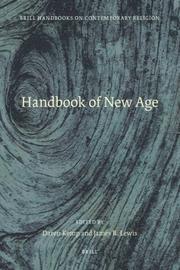
ISSN: 18746691 ISBN: 1282396862 9786612396861 9047420136 9789047420132 9789004153554 9004153551 9781282396869 6612396865 Year: 2007 Volume: 1 Publisher: Leiden Boston Brill
Abstract | Keywords | Export | Availability | Bookmark
 Loading...
Loading...Choose an application
- Reference Manager
- EndNote
- RefWorks (Direct export to RefWorks)
The Handbook of New Age is a comprehensive survey of alternative spiritualities: their history, their global impact, their cultural influence and how they are understood by scholars. Chapters by many of the leading scholars of the movement give the latest analysis of contemporary spiritual trends, and present up-to-date observations of the interaction between the New Age movement and many different fields of knowledge and research.
New Age movement. --- Aquarian Age movement --- Cults --- Social movements --- Occultism --- Nouvel Age (Mouvement) --- New Age --- alternative spiritualities --- culture --- contemporary spiritual trends --- the New Age movement
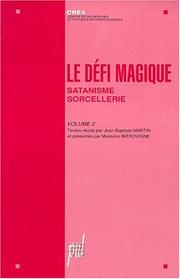

ISBN: 2729704949 2729704965 9782729704964 2729710388 2729710396 9782729704940 Year: 2018 Publisher: Lyon : Presses universitaires de Lyon,
Abstract | Keywords | Export | Availability | Bookmark
 Loading...
Loading...Choose an application
- Reference Manager
- EndNote
- RefWorks (Direct export to RefWorks)
Les tentatives contemporaines de reconstitution des identités perdues ou de plus en plus problématiques sont des processus qui relèvent pour une part importante des religions. La reconquête - voire la révolte - identitaire et la recherche du sens s'effectuent aujourd'hui dans deux directions principales. L'une, à partir de ce que le groupe capte par ses antennes, qui sont en situation d'interaction planétaire. L'autre, par ce qu'il radicalise à partir de sa mémoire collective et de ses racines. Les religions contemporaines produisent, par syncrétisme, de l'inédit et font réapparaître des formes de spiritualité que l'on croyait abandonnées et surtout qui ne sont plus l'œuvre des grandes institutions ecclésiales. Ce premier volume du Défi magique - défi qui se présente aujourd'hui comme une insurrection néoromantique contre les ruptures et les dualismes de la modernité - étudie un certain nombre de ces courants de pensée et de ces mouvements : le développement de l'ésotérisme et de l'occultisme en Europe et aux Etats-Unis ; l'évolution du spiritisme en France et au Brésil ; la constitution de certaines spécificités nationales en Russie, aux Pays-Bas, en Israël ; la formation et la diffusion de la nébuleuse du “Nouvel Age”.
Occultism --- Witchcraft --- Satanism --- Magic --- New Age movement --- Congresses. --- Ésotérisme --- Magie --- Satanisme --- Sorcellerie --- Histoire --- Histoire. --- Occultism - Congresses. --- Witchcraft - Congresses. --- Satanism - Congresses. --- Magic - Congresses. --- New Age movement - Congresses. --- Religion --- Sociology --- religion --- spiritualité --- ésotérisme --- occultisme --- spiritisme --- magie --- mystique --- Nouvel Age --- Literature --- Psychology, Psychoanalysis --- satanisme --- sorcellerie --- exorcisme --- Église --- psychanalyse --- psychatrie --- littérature --- New Age --- psychiatrie --- histoire de l'ésotérisme --- la France --- ésotérisme américain --- Brésil --- psychologie --- le Nouvel Age --- démons --- Japon
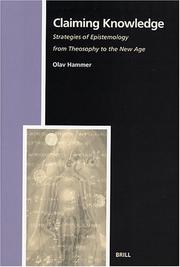
ISBN: 900413638X 9789004136380 9786610465286 1423714504 128046528X 9047403371 9781423714507 9789047403371 Year: 2004 Publisher: Leiden Boston Brill
Abstract | Keywords | Export | Availability | Bookmark
 Loading...
Loading...Choose an application
- Reference Manager
- EndNote
- RefWorks (Direct export to RefWorks)
This volume deals with the transformation of religious creativity in the late modern West. Its point of departure is a set of esoteric beliefs, from Theosophy to the New Age. It shows how these traditions have adapted to the cultural givens of each successive epoch. The claims of each movement have been buttressed by drawing on various structural characteristics of late modernity. The advance of science has resulted in attempts to claim scientific status for religious beliefs. Globalization has given rise to massive loans from other cultures, but also to various strategies to radically reinterpret foreign elements. Individualism has led to an increasing reliance on experience as a source of legitimacy. The analytical tools applied to understanding religious modernization shed light on changes that are fundamentally reshaping many religious traditions. This publication has also been published in hardback, please click here for details.
Knowledge, Theory of (Religion) --- Postmodernism --- Theosophy. --- New Age movement. --- Théorie de la connaissance (Religion) --- Postmodernisme --- Théosophie --- Nouvel Age (Mouvement) --- Religious aspects. --- Aspect religieux --- Aquarian Age movement --- Cults --- Social movements --- Occultism --- Cosmology --- Religions --- Anthroposophy --- Epistemology, Religious --- Religious epistemology --- Religious knowledge, Theory of --- Religion --- Theology, Doctrinal --- Philosophy
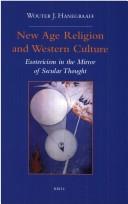
ISSN: 01698834 ISBN: 9004106952 9789004106956 9004106960 9789004106963 9047400127 9789047400127 1417540710 9781417540716 128046397X 9786610463978 9004378936 9789004378933 Year: 1996 Volume: 72 Publisher: Leiden New York E.J. Brill
Abstract | Keywords | Export | Availability | Bookmark
 Loading...
Loading...Choose an application
- Reference Manager
- EndNote
- RefWorks (Direct export to RefWorks)
Analyzing contemporary New Age beliefs, this work argues that the foundations of such beliefs lie in the Western esoteric traditions of the Renaissance. The modern New Age movement is seen as having emerged from the secularization of those esoteric traditions during the 19th century.
298.9 --- 141.339 --- New Age Movement --- Occultism --- #SBIB:011.GIFTSOC --- #SBIB:316.331H450 --- Art, Black (Magic) --- Arts, Black (Magic) --- Black art (Magic) --- Black arts (Magic) --- Occult, The --- Occult sciences --- Religions --- Supernatural --- New Age movement --- Parapsychology --- Aquarian Age movement --- Cults --- Social movements --- 298.9 Recente niet-christelijke of afgeleid-christelijke religies; New Age --- Recente niet-christelijke of afgeleid-christelijke religies; New Age --- 141.339 Esoterische scholen:--andere --- Esoterische scholen:--andere --- Morfologie van de godsdiensten: religieuze bewegingen en sekten --- New Age movement. --- Occultism. --- Nouvel Age (Mouvement) --- Occultisme --- Supernatural. --- Religion --- Miracles --- New Age religion --- Western culture --- Esotericism --- secularism --- channeling --- healing --- personal growth --- New Age science --- Neopaganism --- death --- survival
Book
ISBN: 1474253229 1474253237 1474253210 9781474253215 9781474253208 1474253202 9781474253222 9781474253239 9781474253222 Year: 2016 Publisher: New York : Bloomsbury Academic,
Abstract | Keywords | Export | Availability | Bookmark
 Loading...
Loading...Choose an application
- Reference Manager
- EndNote
- RefWorks (Direct export to RefWorks)
"How--and why-- were UFOs so prevalent in both conspiracy theories and the New Age milieu in the post-Cold War period? In this ground-breaking book, David G. Robertson argues that UFOs symbolized an uncertainty about the boundaries between scientific knowledge and other ways of validating knowledge, and thus became part of a shared vocabulary. Through historical and ethnographic case studies of three prominent figures--novelist and abductee Whitley Strieber; environmentalist and reptilian proponent David Icke; and David Wilcock, alleged reincarnation of Edgar Cayce--the investigation reveals that millennial conspiracism offers an explanation as to why the prophesied New Age failed to arrive--it was prevented from arriving by malevolent, hidden others. Yet millennial conspiracism constructs a counter-elite, a gnostic third party defined by their special knowledge. An overview of the development of UFO subcultures from the perspective of religious studies, UFOs, Conspiracy Theories and the New Age is an innovative application of discourse analysis to the study of present day alternative religion."--Bloomsbury Publishing.
Human-alien encounters. --- Conspiracy theories. --- New Age movement. --- Millennialism. --- Amillennialism --- Chiliasm --- Millenarianism --- Millennianism --- Postmillennialism --- Premillennialism --- Dispensationalism --- Fundamentalism --- Millennium (Eschatology) --- Aquarian Age movement --- Cults --- Social movements --- Occultism --- History --- Alien encounters with humans --- Alien-human contacts --- Alien-human encounters --- Close encounters of the third kind --- Contacts of humans with extraterrestrial beings --- Encounters of humans with extraterrestrial beings --- Extraterrestrial encounters with humans --- Extraterrestrial-human encounters --- Human-alien contacts --- Human contacts with extraterrestrial beings --- Human encounters with extraterrestrial beings --- Unidentified flying objects --- Extraterrestrial beings --- Errors, inventions, etc. --- Sightings and encounters --- Strieber, Whitley. --- Icke, David. --- Wilcock, David, --- Cayce, Edgar, --- Strieber, Louis Whitley --- Barry, Jonathan, --- Striber, Uitli --- שטרייבר, ויטלי --- Rencontres avec les extraterrestres --- Théories du complot --- Nouvel Age (Mouvement) --- Millénarisme --- Icke, David --- aquarian conspiracies --- Millennial Conspiracism --- UFOs --- Conspiracism --- popular Millennialism --- the Cold War --- 1947-1987 --- Whitley Strieber --- the Abductee Narrative --- David Icke --- the Reptilian Thesis --- the Science of Oneness --- David Wilcock --- 2012 Millennialism
Book
ISBN: 1684481015 9781684481019 1684480973 1684480981 Year: 2019 Publisher: Lewisburg, PA
Abstract | Keywords | Export | Availability | Bookmark
 Loading...
Loading...Choose an application
- Reference Manager
- EndNote
- RefWorks (Direct export to RefWorks)
"Do women have souls? Christianity has traditionally held the soul to be the seat of reason, intelligence, humanity, immortality, and moral agency. But the Book of Genesis never says that God breathed a soul into Eve. Women's souls thus became significant in Reformation satires as Protestants and Catholics debated whether scripture alone or institutional authority ought to determine interpretation. In England, these satires eventually intersected with what scholars have called the "Trinitarian Controversy," a dispute about the nature of Christ that paralleled the interpretive difficulty regarding the nature of women's souls. In order to marginalize heterodox thinkers who claimed that Christ was not of the same substance as God the Father, orthodox Anglicans collapsed the distinction between schism and heresy by comparing heterodox Christians to a sexualized stereotype of Muslim despots. Part of this stereotype was the (erroneous) claim that Muslim doctrine asserted that women did not have souls and could only experience physical, not intellectual, pleasure. Thus, the problem of competing Christian biblical interpretations could be foisted onto a stereotype of Muslim men as brutal, self-serving misogynists. Englishwomen soon took up the trope to argue that a truly enlightened, and necessarily Christian, Englishman would support improvements in women's education--and feminist orientalism was born"--
English literature --- Women in literature. --- Soul in literature. --- Orientalism in literature. --- Woman (Christian theology) in literature --- Women in drama --- Women in poetry --- History and criticism. --- Women authors --- Litterature anglaise --- Âme --- Orientalisme (litterature) --- Orientbild --- Frauenliteratur --- English literature. --- Femmes dans la litterature. --- Âme dans la litterature. --- Orientalisme dans la litterature. --- Écrits de femmes anglais --- British literature --- Inklings (Group of writers) --- Nonsense Club (Group of writers) --- Order of the Fancy (Group of writers) --- Women's writings, English --- Themes, motifs. --- Dans la litterature. --- Women authors. --- Histoire et critique. --- Female authors --- Zielke-Nadkarni, Andrea --- Women as literary characters --- Feminismus --- Feministische Literatur --- Frauendichtung --- Frau --- Literatur --- Bild --- Orient --- Motiv --- Littérature orientaliste --- Orient littéraire --- Orientalisme --- Orientalisme en littérature --- Orientalisme littéraire --- Littérature --- Âme (philosophie) --- Âme --- Contribution au concept d'âme --- Pneûma --- Psuché --- Psukhê --- Psyché --- Souffle --- Âme du monde --- Corps --- Esprit --- Intellect --- Intériorité --- Psychisme --- Réminiscence --- Immortalité --- Métaphysique --- Philosophie de l'homme --- Dans la littérature --- Esthétique --- Philosophie --- religion --- Nouvel âge --- philosophie --- Hövener, Andreas --- 2013
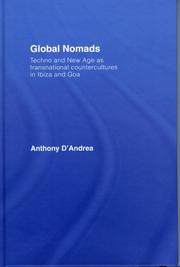
ISBN: 1134110502 1280715626 9786610715626 0203962656 9780203962657 6610715629 041542013X 9780415420136 9781134110452 9781134110490 9781134110506 9780415553674 1134110499 Year: 2007 Publisher: Abingdon, Oxon New York Routledge
Abstract | Keywords | Export | Availability | Bookmark
 Loading...
Loading...Choose an application
- Reference Manager
- EndNote
- RefWorks (Direct export to RefWorks)
Global Nomads provides a unique introduction to the globalization of countercultures, a topic largely unknown in and outside academia. Anthony D'Andrea examines the social life of mobile expatriates who live within a global circuit of countercultural practice in paradoxical paradises. Based on nomadic fieldwork across Spain and India, the study analyzes how and why these post-metropolitan subjects reject the homeland in order to shape an alternative lifestyle. They become artists, therapists, exotic traders and bohemian workers seeking to integrate labor, mobility and spirit
Counterculture. --- Noncitizens --- Hippies --- New Age movement. --- Ecstatic dance --- Techno music --- Globalization --- Transnationalism. --- Trans-nationalism --- Transnational migration --- International relations --- Detroit techno (Music) --- Electronic dance music --- Trance dance --- Dance --- Aquarian Age movement --- Cults --- Social movements --- Occultism --- Flower children --- Persons --- Bohemianism --- Counterculture --- Counter culture --- Countercultures --- Culture --- Subculture --- Aliens --- Enemy aliens --- Expatriates --- Foreign citizens (Aliens) --- Foreign population --- Foreign residents --- Foreigners --- Resident aliens --- Unnaturalized foreign residents --- Deportees --- Exiles --- Immigrants --- Refugees --- Social life and customs. --- Social aspects. --- Legal status, laws, etc. --- Contre-culture --- Etrangers --- Nouvel Age (Mouvement) --- Danse extatique --- Techno (Musique) --- Mondialisation --- Transnationalisme --- Social life and customs --- Social aspects --- Moeurs et coutumes --- Aspect social --- Illegal aliens --- Illegal immigrants --- Non-citizens --- Unauthorized immigrants --- Undocumented aliens --- Undocumented immigrants --- Ibiza --- Spanien --- Goa --- Indien --- Ibiza. --- Spanien. --- Goa. --- Indien. --- Bharat --- Indische Union --- Altindien --- Hindustan --- Hindostan --- Indie --- Indian Union --- Bhārata Gaṇarājya --- Bhārata --- Republik Indien --- Dominion of India --- India --- Republic of India --- Inde --- Indië --- Bharata --- Indiia --- Indland --- Hindiston Respublikasi --- Satharanarat 'India --- Yin-tu --- Inder --- Britisch-Indien --- Südasien --- 15.08.1947 --- -Goa, Daman and Diu --- 30.05.1987 --- -Isbāniyā --- Spain --- Espagne --- Estado Español --- España --- Espanja --- Hispania --- Spanier --- Iberische Halbinsel --- Eivissa --- Insel --- Pityusen --- Ǧazīrat Yābis
| Listing 1 - 7 of 7 |
Sort by
|

 Search
Search Feedback
Feedback About UniCat
About UniCat  Help
Help News
News